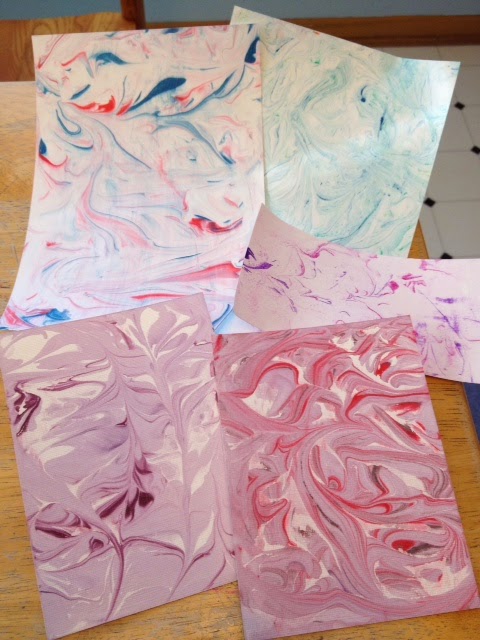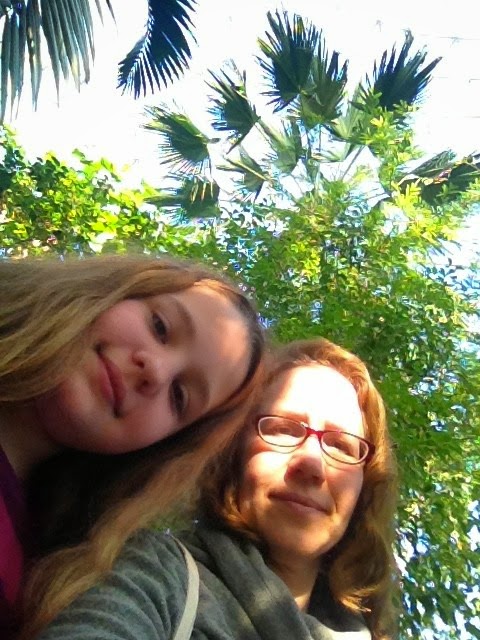 |
| My daughter and I enjoyed making this marbled paper. |
"...self awareness, creative incubation, improvisation and evaluation, memory consolidation, autobiographical planning, goal driven thought, future planning, retrieval of deeply personal memories, reflective consideration of the meaning of events and experiences, simulating the perspective of another person, evaluating the implication of self and others' emotional reactions, moral reasoning, and reflective compassion."
These
rewards include self- awareness, creative incubation, improvisation and
evaluation, memory consolidation, autobiographical planning, goal
driven thought, future planning, retrieval of deeply personal memories,
reflective consideration of the meaning of events and experiences,
simulating the perspective of another person, evaluating the
implications of self and others’ emotional reactions, moral reasoning,
and reflective compassion - See more at:
http://www.creativitypost.com/psychology/mind_wandering_a_personal_perspective#sthash.8I9WpzBi.dpuf
These
rewards include self- awareness, creative incubation, improvisation and
evaluation, memory consolidation, autobiographical planning, goal
driven thought, future planning, retrieval of deeply personal memories,
reflective consideration of the meaning of events and experiences,
simulating the perspective of another person, evaluating the
implications of self and others’ emotional reactions, moral reasoning,
and reflective compassion - See more at:
http://www.creativitypost.com/psychology/mind_wandering_a_personal_perspective#sthash.8I9WpzBi.dpuf
These
rewards include self- awareness, creative incubation, improvisation and
evaluation, memory consolidation, autobiographical planning, goal
driven thought, future planning, retrieval of deeply personal memories,
reflective consideration of the meaning of events and experiences,
simulating the perspective of another person, evaluating the
implications of self and others’ emotional reactions, moral reasoning,
and reflective compassion - See more at:
http://www.creativitypost.com/psychology/mind_wandering_a_personal_perspective#sthash.8I9WpzBi.dpuf
These
rewards include self- awareness, creative incubation, improvisation and
evaluation, memory consolidation, autobiographical planning, goal
driven thought, future planning, retrieval of deeply personal memories,
reflective consideration of the meaning of events and experiences,
simulating the perspective of another person, evaluating the
implications of self and others’ emotional reactions, moral reasoning,
and reflective compassion - See more at:
http://www.creativitypost.com/psychology/mind_wandering_a_personal_perspective#sthash.8I9WpzBi.dpuf
These
rewards include self- awareness, creative incubation, improvisation and
evaluation, memory consolidation, autobiographical planning, goal
driven thought, future planning, retrieval of deeply personal memories,
reflective consideration of the meaning of events and experiences,
simulating the perspective of another person, evaluating the
implications of self and others’ emotional reactions, moral reasoning,
and reflective compassion - See more at:
http://www.creativitypost.com/psychology/mind_wandering_a_personal_perspective#sthash.8I9WpzBi.dpuf
These
rewards include self- awareness, creative incubation, improvisation and
evaluation, memory consolidation, autobiographical planning, goal
driven thought, future planning, retrieval of deeply personal memories,
reflective consideration of the meaning of events and experiences,
simulating the perspective of another person, evaluating the
implications of self and others’ emotional reactions, moral reasoning,
and reflective compassion - See more at:
http://www.creativitypost.com/psychology/mind_wandering_a_personal_perspective#sthash.8I9WpzBi.dpuf
These
rewards include self- awareness, creative incubation, improvisation and
evaluation, memory consolidation, autobiographical planning, goal
driven thought, future planning, retrieval of deeply personal memories,
reflective consideration of the meaning of events and experiences,
simulating the perspective of another person, evaluating the
implications of self and others’ emotional reactions, moral reasoning,
and reflective compassion - See more at:
http://www.creativitypost.com/psychology/mind_wandering_a_personal_perspective#sthash.8I9WpzBi.dpuf
 |
| Learn about shaving cream marbling here. |
That's a lot of benefits! I'm thoroughly convinced. I'm also thoroughly convinced of the benefits of creating and making. Some people have opportunities to use their creativity and "make stuff" in their careers or paid employment. Although, I suspect that's not the case for a lot of people. We can certainly do many things in a creative way, even mundane tasks or housework. But what I'm talking about here is making or doing something as an intentional creative outlet. My own creative pursuits have been motivated in the past few years by reading various blog posts and books on creativity, particularly those by authors Brene Brown, Austin Kleon, and Lori Pickert.
A favorite read of mine - from the blog "Rands in Repose" - is entitled "The Builder's High," and is an excellent reminder to create and not just consume. I'd like to quote the entire post right here. Please do yourself a favor and read it. Here are few choice quotes:
"This is a reminder not to let the digital world full of others' moments deceive you into devaluing your own. Their moments are infinite - your moments are finite and precious - and...I'm wondering how much we want to create versus consume.
What's the last thing you built when you got on that high? You know that high I'm talking about? It's staring at a thing that you brought into the world because you decided it needed to exist."
 |
| We also made candles with melted crayons & Crisco. |
"Building" or "making" or "creating"
can take so many different forms:
writing, painting, knitting, drawing, soap-making, doodling, sewing, home-decorating, photography, graphic design, collage, wood-working, animation, pottery, choreography, film-making, embroidery, cooking, baking, making sculptures, computer programming, composing music, gardening...
The possibilities are endless,
and so I'm going to stop trying to list them all.
 |
| Learn how to make these candles here. |
The key is to find what you enjoy - and that you enjoy both the process and the (potential) product. Sometimes the product doesn't even matter. Sure, we feel a sense of accomplish with a satisfactory finished product - a knitted scarf, a short story, a painting, a delicious meal. However, often the process is just enough. For me, embroidery is an activity where the process is enough. I have never completed any particular embroidery project, although maybe someday I will want to do that. For now, I just enjoy the creative and contemplative process of stitching with colorful thread.
In a well-timed bit of synchronicity, I was re-reading parts of The Artist's Way by Julia Cameron and found this passage in which she writes about how the Bronte sisters and Jane Austen hid their stories under their needlework:
"Needlework, by definition regular and repetitive, both soothes and stimulates the artist within. Whole plots can be stitched up while we sew. As artists, we can very literally reap what we sew."I love that! It's all related, isn't it? Our need for boredom or contemplation - to fuel our need for creative expression and problem-solving - to fuel our need to build and make stuff - during which we might just contemplate our next project or plan.
So - get started. Make something! It'll feel good.













